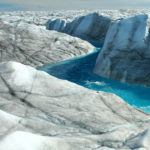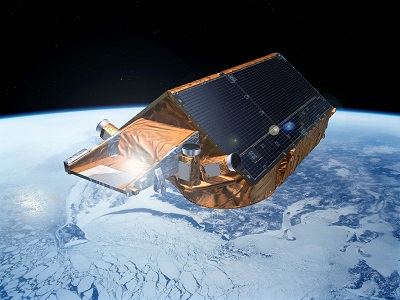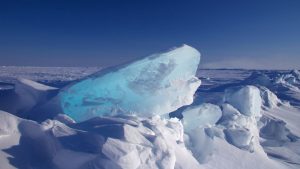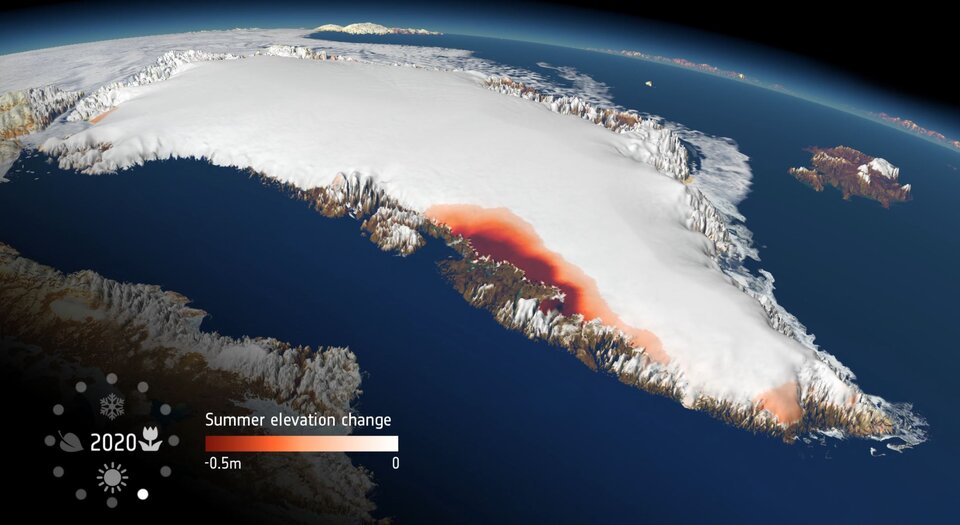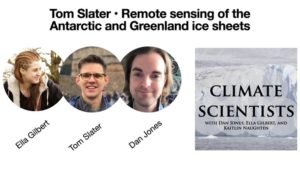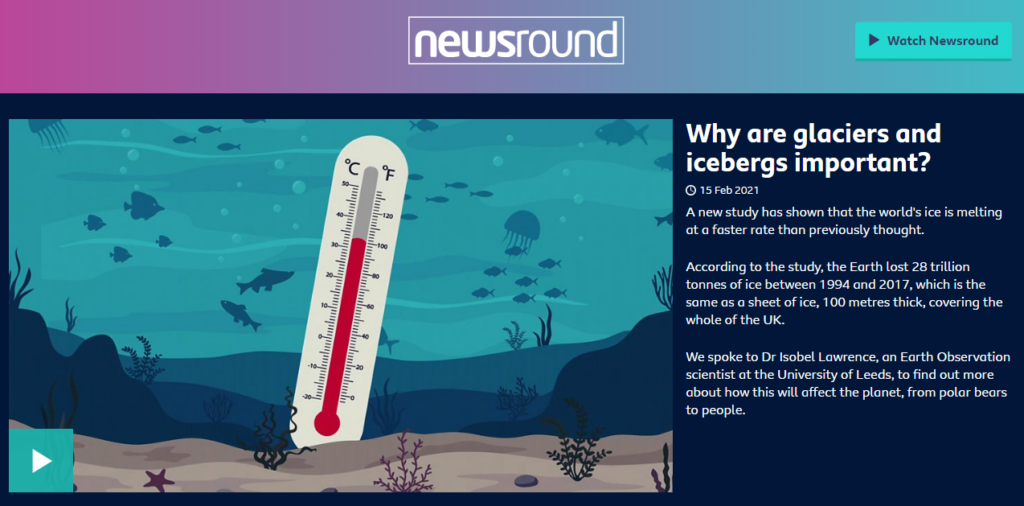CPOM has a significant presence in the media, whether it’s expertise provided by our scientists or news about CPOM itself. You can read a selection of recent media coverage below:
01.07.24: New threat to Antarctic Ice
CPOM PI Dr Sammie Buzzard (Northumbria University) comments on threats to Antarctic ice in this article featured in Inside Climate News.
25.03.24: Professor Andrew Shepherd explains the difference between climate and weather in this video from the European Space Agency Climate Office
Credit: ESA
26.1.24: Using AI to map giant icebergs
Dr Anne Braakmann-Folgmann, former CPOM PhD researcher, is quoted throughout the article featured in The India Education Diary.
26.01.24: Study tracking rapid retreat of Antarctic glacier ‘demonstrates just how rapidly remote Antarctic glaciers can respond to changes in their surrounding environment’.
Professor Mal McMillan and the study he recently co-authored is discussed in The India Education Diary.
25.01.24: Dr Sammie Buzzard discussing the world’s largest iceberg A23a
CPOM director, Assistant Professor Sammie Buzzard (Northumbria University) discusses the world’s largest iceberg A23a on @trtworld‘s Just 2 Degrees
18.01.24: Ice Loss in Greenland and its affect on Amoc
CPOM director, Professor Andrew Shepherd comments on recent study examining ice loss in Greenland in this article in the Guardian.
05.01.24: Stand Up Maths features CPOM director Assistant Professor Sammie Buzzard
CPOM director, Assistant Professor Sammie Buzzard (Northumbria University) discusses mathematical modelling relating to Melt Lake Development on an Ice Shelf with stand up comedian and best-selling maths author Matt Parker on his Youtube Channel @standupmaths.
Watch the interview now on Youtube
14.12.23: World’s biggest iceberg A23a at almost 1 trillion tonnes
Scientists including CPOM’s Andy Ridout (UCL), Director Andy Shepherd and former CPOM PhD researcher Anne Braakmann-Folgmann comment on their recent findings relating to iceberg A23a for BBC News.
30.11.23: Protecting Our Planet (POP23)
CPOM directors, Professor Andrew Shepherd and Assistant Professor Sammie Buzzard (both of Northumbria University) took part in POP23, leading interactive live line sessions with school students across the UK on how ice and maths can be applied in endeavours to protect the planet.
To find out more about POP23 and the upcoming POP24 event please visit stem.org.uk
29.11.23: Study on Antarctic Glacier Retreat
Co-author and CPOM Associate Mal McMillan (Lancaster University) comments on the study warning that apparently stable glaciers in the Antarctic can “switch very rapidly” and lose large quantities of ice as a result of warmer seas.
13.11.24: Faster Arctic region warming – new modelling study released
A new modelling study led by UCL (University College London), including CPOM members Robbie Mallett, Michel Tsamados, and Julienne Stroeve, has found that if the Arctic region were warming at the average global rate, it would reach a global temperature increase of 2 °C eight years earlier than if it already had done so.
26.04.23: CryoSAT reveals ice loss from glaciers
A paper, published in the journal Geophysical Research Letters, describes how scientists have used a particular technique of processing CryoSat data to reveal that glaciers lost a whopping 2720 Gigatonnes of ice between 2010 and 2020.
Their research also demonstrates that higher air temperatures are responsible for 89% of this ice loss.
CPOM associate and co-author, Dr Noel Gourmelen based at the University of Edinburgh said:
“Some years ago, we developed a technique of processing CryoSat data, called swath processing, which has revolutionised the use of CryoSat data over complex icy terrains. It unveils a wealth of new detail on glaciers”
20.04.23: The IMBIE Team release a new assessment of ice sheet mass balance showing that the ice sheets lost 7,560 billion tonnes of ice between 1992 to 2020
A report, states that ice loss from Greenland and Antarctica has increased fivefold since the 1990s, and now accounts for a quarter of sea-level rise.
The latest IMBIE assessment, states that between 1992 and 2020, the polar ice sheets lost 7560 billion tonnes of ice – equivalent to an ice cube measuring 20 km each side.
Dr Inès Otosaka from the University of Leeds, who led the study, said:
“Ice losses from Greenland and Antarctica have rapidly increased over the satellite record and are now a major contributor to sea level rise. Continuously monitoring the ice sheets is critical to predict their future behaviour in a warming world and adapt for the associated risks that coastal communities around the world will face.”
ESA, BBC News, Northumbria University
27.02.23: Sea ice reduction in Antarctica
CPOM director, Professor Andrew Shepherd (University of Northumbria) interviewed following the publication of two related papers on Sea ice reduction in Antarctica.
22.02.23: Tribute to Professor David Vaughan OBE
CPOM director, Professor Andrew Shepherd (University of Northumbria) and Dame Jane Francis (BAS) pay tribute to Professor David Vaughan OBE in this special BBC episode dedicated to his life and work.
19.01.23: Future-proofing ice measurements from spaceCPOM director, Professor Andrew Shepherd (University of Leeds) is quoted discussing the impact of a campaign undertaken by the ESA and Nasa, along with the British Antarctic Survey and a team of scientists which used satellites and a plane fitted with cutting-edge sensors to measure the thickness of sea ice in the Antarctic.
European Space Agency, Space Daily
18.01.23: Greenland Ice Sheet at Warmest Level in Last 1,000 Years – StudyResearchers have calculated that north-central Greenland was on average 1.5°C warmer between 2001 and 2011 than it was in the 20th century. They said the findings, published in the journal Nature, suggest human-led activities could be impacting the region and accelerating the rate at which more ice is being lost from the plate. CPOM director, Professor Andrew Shepherd (University of Leeds) provides comments on the research.
“There is plenty of evidence that the Arctic has warmed rapidly over recent decades.”
The Evening Standard, AOL, USA Today
03.11.22: These glaciers are on track to disappear within the next 30 years, new report shows
A new UN report says glaciers across the globe will be unavoidably lost by 2050 due to climate change. Dr Thomas Slater (University of Leeds) says:
“While it’s sad to hear some of these glaciers could be lost, we should take hope in the fact that reducing emissions can save the majority of them and avoid disruption to the water supply of millions of people worldwide who live downstream.”
01.11.22: Summer Thawing Occurs Nearly a Month Earlier and Lasts Nearly Two Months Longer in Antarctica, Research Says
CPOM director, Prof Andy Shepherd (University of Leeds) is quoted referring to IMBIE Nature paper.
26.10.22: The Climate Book: What happens at 1.5, 2 and 4°C of global warming?
CPOM associate investigator, Dr Tamsin Edwards (KCL) contributes to Greta Thunberg’s ‘The Climate Book’ her expert contribution summarising of key IPCC climate projections under different levels of warming (1.5°C, 2°C, 4°C), and how much warming Climate Action Tracker currently says we are heading for.
21.10.22: Image From Space Shows Mississippi River Like You’ve Never Seen It Before
CPOM director, Professor Andy Shepherd provides comments on the ESA satellite images.
06.10.22: Decades of satellite data reveal the risks of climate tipping points
‘Can we detect tipping points in satellite data? The cryosphere is almost certainly our best chance’.
CPOM director, Professor Andy Shepherd (University of Leeds) comments in the ESA article on how scientists are able to uncover the threat of sudden and potentially irreversible changes to the icy parts of the planet using decades long time series that draw on ESA’s Earth observation archives.
“The impacts of global warming are often felt first in the cryosphere as it is so finely balanced. Relatively small increases in temperature can lead to the melting of vast amounts of ice, which is difficult to reverse – even if the planet were to suddenly cool.
“There is little doubt that some parts of the cryosphere – including giant glaciers in West Antarctica and ice shelves fringing the Antarctic Peninsula – are already seeing worrying changes that won’t be reversed any time soon.”
15.09.22: Satellites now get full-year view of Arctic sea-ice
Following the publication of paper A year-round satellite sea-ice thickness record from CryoSat-2 | Nature, CPOM associates and co-authors Prof Julienne Strove and Michel Tsamados (UCL) are quoted throughout the BBC article explaining how satellites can now measure the thickness of sea-ice covering the Arctic Ocean all year round.
“We simulated what would be the echo shapes that we would get for different ice surface types – whether they had meltponds; whether it was flooded ice; or ice of different roughnesses; or simply leads. We created this huge database of physically based estimates of what the radar return should look like, and then we matched those to the individual radar pulses from the instrument to find echoes that matched the best.”
BBC News, Yahoo news, Safety4sea
07.09.22: Why is Greenland ice sheet melting faster this September? Experts weigh in
Greenland’s ice sheet recorded an unusual increase in melting on September 3, 2022, according to the Arctic Risk Platform, a global team of Arctic experts. This spike is due to warming in the Arctic region, they said.
The melt area recorded on the day was 592,500 square kilometres.
CPOM associate, Prof Julienne Stroeve (UCL) is quoted:
“Temperatures in September drop below freezing and melt season ends around mid-September“
03.08.22: ESA Webinar recap: Space solutions to ocean problems
This summer, CPOM associate Professor Mal McMillan based at Lancaster University & Joakim Kugelberg OHB SE spoke at ESA’s “Space for a greener maritime future” webinar on the importance of satellites like CryoSat to monitor Arctic weather & the climate transformation our planet is facing.
ESA – Webinar recap: Space solutions to ocean problems
07.06.22: The British towns at risk of being wiped from the map forever by rising seas and coastal erosion
Some of Britain’s seaside towns and villages may have to be abandoned because of rising seas and coastal erosion, according to the official in charge of Britain’s flood protection. Professor Andrew Shepherd (CPOM Director):
“In the UK alone, a million citizens will be exposed to annual flooding by the end of this century, and so it’s right to start a planned retreat from the most vulnerable parts of our shoreline.”
19.05.22: World Meteorological Organisation report
CPOM Director, Andrew Shepherd (University of Leeds) discusses the findings of a World Meteorological Organisation report which has shown that four key climate change indicators broke records in 2021. He also touches on what can be done to try monitor and mitigate the impact of climate change.
CNN International Europe – Clip available upon request
22.04.22: Earth Day
CPOM Director, Andrew Shepherd (University of Leeds) talks to BBC Radio Leeds about Earth Day.
14.04.22: Powerful ‘rivers in the sky’ could cause Antarctic Peninsula’s biggest ice shelf to collapse
CPOM Associate Julienne Stroeve, UCL provided comments on a new study that shows the “rivers in the sky” — which dump rain and snow when they make landfall — are also causing extreme temperatures, surface melt, sea-ice disintegration and large ocean swells which are destabilizing ice shelves on the Antarctic Peninsula, a long, spindly mountain chain that points northwards to the tip of South America.
“The question is whether or not atmospheric rivers will happen more often as the climate changes.”
22.03.22: Arctic sea ice could hit maximum extent ‘much earlier’ than usual
CPOM Associate Julienne Stroeve, UCL provided comments in article on an extreme heat event in the Arctic that could cause it to reach the maximum of the extent of its ice for this year “considerably earlier” than usual.
“It is unusual to have such large departures from average occur at the same time at both poles, and in the Arctic it may have led to the maximum sea ice extent reached considerably earlier than average.”
The Guardian, China Daily, France24
14.03.22: Sea ice that slowed the flow of Antarctic glaciers abruptly shatters in three days
In just three days in late January, a mass of ice the size of Philadelphia fragmented from the Larsen-B embayment on the Antarctic Peninsula and floated away, after persisting there for more than a decade.
Study lead author, Anne Braakmann-Folgmann (PhD researcher based at the University of Leeds) who has researched A68, explains that concerns were raised when it calved because “it reduced the remaining ice shelf area by a significant amount [and] Larsen-A and -B had already disintegrated.” Iceberg calving is known to influence the stability of the parent ice shelf that it leaves behind, but since 2017, what is left of Larsen-C has remained stable.
More information: A. Braakmann-Folgmann et al, Observing the disintegration of the A68A iceberg from space, Remote Sensing of Environment (2022). DOI: 10.1016/j.rse.2021.112855
16.02.22: Sea ice fragmentation module to improve climate model predictions
The three-year project, which is being led by CPOM’s Sea Ice lead, Professor Danny Feltham at the University of Reading, will result in a new sea ice fragmentation module delivered to climate and weather modelling groups including the Met Office, the National Oceanography Centre, the British Antarctic Survey, and the European Centre for Medium-Range Weather Forecasts.
07.02.22: Expert reaction to glaciers maybe not containing as much ice as previously thought
CPOM Director, Professor Andrew Shepherd and CPOM scientist Dr Tom Slater (University of Leeds) provide their expert reactions to a study led by the Institute of Environmental Geosciences in Grenoble, published in Nature Geoscience, which has looked at glaciers maybe not containing as much ice as previously thought, putting water supplies at risk for millions of people.
“Because there is less ice stored in the world’s glaciers than we had thought they will disappear earlier than expected, and so the communities that depend on their ice and water will experience the worst effects of climate change sooner.”
Science Media Centre, The Bobr Times, France24, MSN France, Sciences et Avenir, Le Journal de Quebec, TRT World, Gulf News
07.02.22: Greenland lost enough ice in last 2 decades to cover entire US in 1.5 feet of water
A piece on findings of a study by Polar Portal, which examined 20 years of satellite data to see the extent of ice loss on the Greenland ice sheet. Includes a quote from Professor Andrew Shepherd, Director of CPOM.
“As a rule of thumb, for every centimeter rise in global sea level, another 6 million people are exposed to coastal flooding around the planet.”
Space.com, LiveScience, Verve Times, Earth.com, PSNews
20.01.22: Mega iceberg released 152 billion tonnes of fresh water into ocean
Researchers from the Centre for Polar Observation and Modelling (CPOM) and British Antarctic Survey (BAS) have been monitoring the giant A68A Antarctic iceberg from space and reveal that a huge amount of fresh water was released as it melted around the sub-Antarctic island of South Georgia.
Satellites revealed that 152 billion tonnes of fresh water entered the seas around the sub-Antarctic island of South Georgia when the megaberg A68A melted over 3 months in 2020/2021, according to a new study. Lead author and CPOM PhD researcher Anne Braakmann-Folgmaan, based at the University of Leeds, said:
“This is a huge amount of melt water, and the next thing we want to learn is whether it had a positive or negative impact on the ecosystem around South Georgia.
Because A68A took a common route across the Drake Passage, we hope to learn more about icebergs taking a similar trajectory, and how they influence the polar oceans.”
University of Leeds news story, European Space Agency, British Antarctic Survey, Daily Mail, BBC News, The New York Times, Daily Express | FR24 | Tempo (in Indonesian) | HVG (in Hungarian) | Latest Nigerian News | Eminetra South Africa | Science Times | Interesting Engineering | USA Today, CBS News, The Weather Channel
11.01.22: Inuit navigate a warming world
This piece quotes research led by Dr Thomas Slater, CPOM scientist based at the University of Leeds.
“In January 2021, researchers at the University of Leeds found that 28 trillion tonnes of sea ice, glaciers and ice sheets had melted worldwide since the mid-1990s.”
University news story, National Observer (Canada)
03.12.21: Arctic rain may soon be more common than snowfall
CPOM Associate Investigator and co-author Professor Julienne Stroeve said:
“As the Arctic continues to warm in response to atmospheric greenhouse gases it is not surprising that the precipitation will start to transition from snow to rain. The worry is that it may happen sooner than we expected, with wide-ranging consequences.”
01.12.21: Rainfall could replace snowfall in the Arctic by 2060, study warns
CPOM Director, Andrew Shepherd (University of Leeds) is quoted:
“’One of the first regions to be altered by this climatic switch from snowfall to rainfall will be the Barents Sea, North of Russia.”
08.11.21: World’s ice is melting faster than ever
CPOM director, Professor Andrew Shepherd features in a short video, discussing how long-term satellite observations from ESA’s Climate Change Initiative are key in monitoring changes in ice sheets over decades.
06.11.21: Ice at the edge of survival: warming is changing the Arctic
CPOM Associate, Prof Julienne Stroeve (UCL), provides comments, ahead of COP26 on the effects of the global warming on the Arctic Circle:
“When the Arctic Circle is covered with snow and ice, it reflects sunlight and heat. But that blanket is declining.”
Illinois News Today, ABC News, Ohio News Time
02.11.21: Global floods fear as Greenland melts
The melting of Greenland’s ice sheets is heightening worldwide flood risks, according to a new study that found more than 3.5 trillion tons have disappeared in the past decade. A team of scientists, led by those at the University of Leeds, determined the melting has increased global sea levels worldwide by one centimeter using satellite data of the massive ice sheets. Lead author, Dr Tom Slater (University of Leeds), quoted:
“As our climate warms, it’s reasonable to expect that the instances of extreme melting in Greenland will happen more often.”
Daily Mail, Times of India, ABC Nyheter (Norwegian), World Journal (Chinese) , University news story, SciTechDaily, Arctic Today, The Independent BD ,The Press Stories, Yahoo News
31.10.21: Antarctic glacier is named in honour of Glasgow
Widespread international coverage of the naming of Glasgow Glacier to mark its hosting of COP26. It is one of several to be named by CPOM PhD researcher Heather Selley in the School of Earth and Environment, University of Leeds, who made the suggestion after publishing research identifying 14 glaciers in the Getz basin of West Antarctica that are thinning and flowing more quickly into the ocean. This was agreed by the UK Government and the announcement was made by Prime Minister Boris Johnson en route to the G20 Summit on Sunday. The coverage is the result of collaboration with Downing Street and Foreign, Commonwealth and Development Office press offices; the British Antarctic Survey; the European Space Agency and UK Space Agency.
BBC News, The Washington Post, The Scotsman, The Scotsman, The Independent, Daily Mail, ITV, The Telegraph, The Guardian, Yorkshire Evening Post , Yahoo, MSN, Ambito (in Spanish), Knack (in Dutch), Manorama (in Malayalam), University news, ITV News
30.10.21: Earth gets hotter, deadlier during decades of climate talks. Coverage ahead of COP26.
Articles focusing on effects of climate change on the globe. CPOM director Prof, Andy Shepherd’s ice loss calculations are referred to highlighting that heat is melting Earth’s ice. Since 1992, Earth has lost 36 trillion tons of ice (33 trillion metric tons). That includes sea ice in the Arctic and Antarctic that melts now more in the summer than it used to, the shrinking of giant ice sheets in Greenland and Antarctica, and melting glaciers.
ABC News, Arkansas Democrat Gazette, The Guardian, WDIO
11.10.21: Antarctica’s last 6 months were the coldest on record
CPOM Scientist Dr Tom Slater, based at the University of Leeds, comments of Antarctica’s last six months been the coldest on record.
“One such example is a cold snap, which can happen due to sudden changes in atmospheric circulation and may not be linked to climate change”
05.10.21 GHub: The new place to be for ice sheet scientists
With NSF funding, ice sheet and computer scientists have created a new online platform that aims to reduce bottlenecks in research on ice sheets and sea level rise. The GHub science gateway hosts datasets, workflows, and tools to unify ice sheet observations and modeling, provide uncertainty quantification, and improve estimates of future sea level rise. This centralized hub is for all different types of ice sheet scientist, from those new to ice sheets to seasoned researchers, and for educators interested in ice sheet science. CPOM Director Andy Shepherd sits on the GHub steering committee.
GHub (vhub.org), University of Buffalo
27.09.21: Mapping the Arctic in partnership with those who use the seas
Professor Julienne Stroeve, within the NERC Centre for Polar Observation and Modelling (CPOM) in UCL Earth Sciences, started a network called the Sea Ice Prediction Network (SIPN) in 2013. SIPN (now in its second phase and referred to as SIPN2) aims to bring together scientists and stakeholders to improve sea ice forecasts and provide a more efficient service for end-users.
16.09.21: When wild weather blew old sea ice south
PhD student Robbie Mallet (UCL) features in article describing how his most recent research accentuates how the loss of this sea ice landscape could accelerate because of one unique characteristic: It can float away.
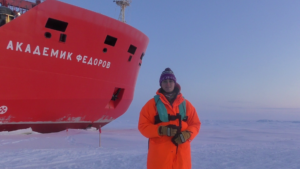
Robbie Mallett experienced the perennial sea ice in the Arctic during a 2019 research expedition. Credit: Robbie Mallett
21.08.21: Rain falls at peak of ice cap for first time on record
This article mentions research led by CPOM researcher, Dr Thomas Slater (University of Leeds) into global ice loss: ‘Another study by the University of Leeds revealed that a record-breaking 28 trillion tonnes of ice – enough to cover the whole of the UK in a sheet over 300ft thick – melted from the Earth between 1994 and 2017.’
20.08.21: The summit of Greenland got rain, rather than snow, for the first time on record
CPOM Research Investigator, Julienne Stroeve (UCL) comments on the recent findings.
19.08.21: Increased snowfall will offset sea level rise from melting Antarctic ice sheet, new study finds
A new study, led by CPOM’s Professor Tony Payne (University of Bristol) predicts that any sea level rise in the world’s most southern continent will be countered by an increase in snowfall, associated with a warmer Polar atmosphere. Using modern methods to calculate projected changes to sea levels, researchers discovered that the two ice sheets of Greenland and Antarctica respond differently, reflecting their very distinct local climates.
“There is little change, however, in projected sea level rise from the Antarctic ice sheet. This is because increased mass loss triggered by warmer oceans is countered by mass gain by increased snowfall which is associated with the warmer Polar atmosphere.“
University of Bristol press release
09.08.21: IPCC author Tamsin Edwards: ‘Still possible to limit warming to 1.5°C
Coverage of the new IPCC report, includes lead author and CPOM Associate Tamsin Edwards (KCL) providing her comments to many media outlets on the current and future state of our planet.
“I think many people aren’t that aware that we have already committed ourselves to changes that are irreversible. That is a profound thing to take on board.”
NY Press News, ITV News, New Scientist
08.08.21: IPCC report
Professor Andrew Shepherd (CPOM Director) is interviewed about the implications of the IPCC report.
03.08.21: Strong winter winds blow thick Arctic ice to melting point
Research led by UCL’s Robbie Mallet (CPOM PhD researcher) and Julienne Stroeve (CPOM Associate Investigators), comment on their study finding powerful winter winds have driven a large amount of thick ice from Arctic seas into warmer waters. The strong winds that swirled clockwise for much of the winter pushed eight per cent of the Arctic’s “perennial ice” into the Beaufort Sea, north of mainland Canada, where two thirds of ice melts during the summer.
“In mid-February we saw that a strong weather system was literally spinning the Arctic sea ice around.”
29.07.21: Amount of Greenland ice that melted on Tuesday could cover Florida in 2 inches of water
CPOM Scientist Dr Tom Slater (University of Leeds), a co-author of the report covered in the article, is quoted.
“In the past decade, we’ve already seen that surface melting in Greenland has become both more severe and more erratic. As the atmosphere continues to warm over Greenland, events such as yesterday’s extreme melting will become more frequent.”
Covered extensively by international outlets, including:
CNN, The Hill, Naver (Korean), Yahoo Japan, National Geographic Poland
16.07.21: Post offers thin evidence that Antarctica is not losing ice
This is a fact-checking piece, debunking a false Facebook post. Professor Andrew Shepherd (CPOM Director) is quoted explaining why a research base in Antarctica would be covered in snow despite global warming.
11.07.21: Climate Scientists: The Podcast
Dr Tom Slater (CPOM Staff Researcher, University of Leeds) joins the Climate Scientists team to discuss remote sensing of ice sheets, the case for pragmatic climate optimism, & discovering a love of science after leaving school
Listen ~wherever you get your podcasts.
04.06.21: Renewable energy and the impact it has on the climate
CPOM Director Professor Andy Shepherd spoke to BBC Radio Leeds to discuss renewable energy and the impact it has on the climate.
04.06.21: Artic sea ice thinning faster than expected, new study shows
Research led by UCL’s Robbie Mallet (CPOM PhD researcher), Julienne Stroeve and Michel Tsamados (CPOM Associate Investigators), comment on the study finding sea ice in the Arctic’s coastal regions may be thinning up to twice as fast as previously thought, with worrying implications for climate change.
“The thickness of sea ice is a sensitive indicator of the health of the Arctic. It is important as thicker ice acts as an insulating blanket, stopping the ocean from warming up the atmosphere in winter, and protecting the ocean from the sunshine in summer. Thinner ice is also less likely to survive during the Arctic summer melt.”
The Guardian, France24, Eurekalert, AZO Cleantech, Engineering and Technology, News and Star
01.06.21: CryoSat reveals ice loss from glaciers in Alaska and Asia
Noel Gourmelen, CPOM Associate Investigator at University of Edinburgh, is amongst the authors of a recent study, which shows that mountain glaciers in the Gulf Alaska and in High Mountain Asia have lost 5% of their volume of ice over last decade.
“It is astonishing to think that over last decade alone, both regions have lost 5% of their volume of ice. What CryoSat has accomplished also is astonishing.”
25.05.21: World’s largest iceberg breaks off Antarctic shelf
Further coverage of ice loss in Antarctica that includes mention of CPOM research from January led by Dr Tom Slater (University of Leeds) that revealed the rate at which ice is disappearing across the planet is speeding up.
18.05.21: Greenland ice sheet on brink of major tipping point, says study
News that ice in Greenland is at a major tipping point includes comments from Professor Andy Shepherd (CPOM Director) about the urgent need for action to save our climate.
“It’s great that we have satellites to track the pulse of our planet and models to perform a health check, but the diagnosis is shockingly clear: our climate is sick and needs urgent care”
07.05.21: Sea level rises from melting ice massively reduced by limiting global warming
Coverage of the new study, from an international research team headed by CPOM Associate Dr Tamsin Edwards (KCL) and including CPOM Director Professor Andy Shepherd, explored the land ice contribution to sea level in the 21st century arising from the world’s glaciers and the Greenland and Antarctic ice sheets.
“Ahead of COP26 this November, many nations are updating their pledges to reduce greenhouse gas emissions under the Paris Agreement.
Global sea level will continue to rise, even if we halt all emissions now, but our research suggests we could limit the damage.”
29.04.21: Global glaciers losing 267 billion tonnes in mass per year – study
Professor Andrew Shepherd (CPOM Director), who was not involved in the study, comments on the findings that show glaciers are losing ice at an accelerated pace in the 21st century.
“Glacier melting accounts for a quarter of Earth’s ice loss over the satellite era, and the changes taking place are disrupting water supplies for billions of people downstream, especially in years of drought when meltwater becomes a critical source.”
28.04.21: Climate change: World’s glaciers melting at a faster pace
CPOM study led by Dr Thomas Slater (CPOM Staff Researcher) is mentioned in the context of similar research that French scientists recently conducted. Professor Andy Shepherd (CPOM Director) is quoted in the article talking about the increasing rate of glacier melting.
21.04.21: Earth Day 2021: Climate change ‘tipping points’ might not be the end of the world after all, report says
Professor Andrew Shepherd (CPOM Director) provides his thoughts on new research by the University of Exeter and the UK Centre for Ecology and Hydrology which suggests climate change tipping points can still be avoided if governments act fast enough.
15.04.21: Interview with Professor Andrew Shepherd
In the light of David Attenborough’s new documentary about the impact of the pandemic on the climate, Professor Andrew Shepherd (CPOM Director) provides his thoughts to BBC Leeds. Professor Shepherd talks about the overall impact of climate change on our lives.
08.04.21: Climate crisis: Third of Antarctic ice shelf area ‘at risk of collapse’ if emissions aren’t rapidly reduced
Professor Andy Shepherd (CPOM Director) comments on a University of Reading study which suggests ice shelves in Antarctica could potentially collapse and release large amounts of water into the ocean if temperatures reach 4C above pre-industrial levels.
23.02.21: CPOM led research shows widespread increase in ice speed across the Getz sector of Antarctica, with some glaciers accelerating by nearly 50%
Widespread coverage of research led by Heather Selley (CPOM PhD Student), which found glaciers in West Antarctica are moving more quickly from land into the ocean, contributing to rising global sea levels. A 25-year record of satellite observations has been used to show widespread increases in ice speed across the Getz sector for the first time, with some ice accelerating into the ocean by nearly 50%.
European Space Agency, British Antarctic Survey, Mirage News, Notimerica,com (in Spanish), The BBC, University News, The Times, Phys.org, Yorkshire Evening Post, ABC Nyheter, Tech2.org, MSN Norway, Science Daily, SciTechDaily
25.01.21: CPOM research that shows the rate of global ice loss is increasing is covered by media outlets worldwide
Widespread coverage of research led by Dr Thomas Slater (CPOM Staff Researcher), which found that the rate of global ice loss is increasing, and that the Earth lost 28 trillion tonnes of ice between 1994 and 2017. Report co-author and PhD researcher Inès Otosaka (CPOM PhD Researcher) also appeared on BBC Radio 4’s Today programme discussing the findings:
Wall Street Journal, BBC Radio 4 (approx. 2 hour 42 mins in), BBC World Service, The Guardian, The Independent,Washington Post, The Times, Nouvelles du Monde (in French), University news, The i, The Telegraph (Print), The Metro (Print), The Sun (Print), Bloomberg, Daily Mail, Gizmodo, La Jornada (Mexico – in Spanish), Science Times, India Today, The Australian (subscription required), De Stentor (in Dutch), University news, Al Jazeera, Japan Times, Cosmos Magazine, MSN, News-24 (In French), Yorkshire Evening Post, La Croix (In French. Print), Mashable, El Confidencial (In Spanish), Financial Express (India), La Liberte (In French),Outlook (India), SpaceRef, News 18|, EcoWatch (referenced in article about 2032 Olympics bid), Yale Environment 360, Radio Habana Cuba, The Independent (1st Feb, 2021), BBC Newsround (15.02.21), Geospatial World, SciTechDaily, Reuters, The National Interest, Mashable UK, World Economic Forum, The Financial
“The melting of ice across the planet is accelerating at a record rate /…/ The rate of loss is now in line with the worst-case scenarios of the Intergovernmental Panel on Climate Change.” https://t.co/Xn9wpWSgfF
— Greta Thunberg (@GretaThunberg) January 25, 2021
View this post on Instagram
08.01.21: The long, alarming decline in sea ice in the Arctic
Quotes from Professor Julienne Stroeve are included in an article looking at forty years of satellite data showing that 2020 was just the latest in a decades-long decline of Arctic sea ice.
“We’ve been moving around 4 million square kilometers of Arctic sea ice every summer for some time.”
NASA Earth Observatory, Brinkwire, The Science Times
23.12.20: CPOM researchers analyse the changing shape of A68a, a giant iceberg heading towards Georgia, over its three-and-a-half-year history
Using data from four satellites, including CryoSat, scientists from CPOM have produced the first assessment of iceberg A68-a’s changing shape.
CPOM PhD researcher Anne Braakmann-Folgmann and CPOM postgraduate researcher Jamie Izzard provided the analysis for this story, which was picked up by media around the world, including:
The BBC, Phys Org, Planeta (in Portuguese), TV Europa (in Portuguese), LIFO (in Greek)
15.12.20: CryoSat Reveals Surprising Ebb and Flow of Subglacial Lakes
George Malczyk, lead author, and CPOM Associate Investigator Noel Gourmelen based at the University of Edinburgh co-authored a paper recently published in Geophysical Research Letters which describes how a decade of radar altimetry observation data have been used to reveal a network of four subglacial lakes under the Thwaites glacier.
“What takes place under the ice sheet is critical to how it responds to changes in the atmosphere and ocean around Antarctica, and yet it is hidden from view by kilometres of ice which makes it very difficult to observe.”
International Thwaites Glacier Collaborations, ESA, Columbia University
20.11.20: EcoLight AZFP Buoy to Monitor Light and Under-Ice Zooplankton
CPOM Associate Investigator Julienne Stroeve (UCL) is a member of a team of scientists that have developed a project called EcoLight which uses an Autonomous Biological Echo Sounding Buoy (ABES) to continuously measure changes in the light field and associated biological responses under sea ice.
16.11.20: Climate crisis: Arctic sea ice freezing at latest date on record
CPOM staff member Dr Isobel Lawrence (University of Leeds) is quoted in a piece on the slow formation of ice in Siberia following a heatwave earlier in the year. Dr Lawrence highlights the potential for impacts from this to be felt globally:
“Sea ice plays a pivotal role in regulating Earth’s climate. There are processes we understand very well, like how the bright surface of sea ice reflects incoming solar radiation back into space. This means that the loss of sea ice drives further warming, a positive climate feedback known as the albedo feedback.”
“There are other processes that we understand less well, like sea ice’s role in global ocean circulation. This means that losing the sea ice will have longer-term consequences for the global climate that we can’t currently predict.”
27.10.20: Warming reaches the coldest region on the planet
Andrew Shepherd (CPOM Director) questions the division of responsibilities in the warming of Antarctica made by the authors of this study.
Although climate models suggest that the South Pole was warmer for long periods in the past, the warming of recent decades exceeds the upper range of his predictions and shows no signs of warming. slow down, so it’s hard to dissociate it from the broader pattern of climate change that is melting the ice along the northernmost areas of Antarctica.
26.10.20: Brave New Arctic: Sea ice has yet to form off of Siberia, worrying scientists
Quotes from Professor Julienne Stroeve are included in an article looking at the worrying impacts over the lack of sea ice yet to form off of Siberia.
Julienne Stroeve, who specializes in sea ice research at NSIDC, adds another potential serious impact to the list: threats to our food supply. “What’s predicted to happen in agricultural sectors is not good news.… We’re going to be living on a very different planet if we keep adding greenhouse gases to the atmosphere,” she said. “We’re conducting this blind experiment, and we don’t yet know the real implications.
Mongabay, Vice, AlKhaleej Today, EarthSky
29.09.20: Antarctica could melt ‘irreversibly’ due to climate change, study warns
Quotes from Professor Andy Shepherd (CPOM Director) are included in a piece looking at the impact of global warming on Antarctica.
This cataclysmic melting will not occur in our lifetimes; the full effects would likely not be seen for roughly 150,000 years, Andrew Shepherd, a climatologist from the University of Leeds in the United Kingdom, who was not involved in the study, told the Daily Mail.
28.09.20: Interview with Professor Andrew Shepherd
Andrew Shepherd is the professor of Earth Observation at the University of Leeds. He told CGTN’s Xi Jia about how a rise of one centimeter in global sea levels will change lives in the world’s coastal communities.
24.09.20: Sea level rise matches worst-case scenario
Comments from Professor Andy Shepherd (CPOM Director) are included in coverage of a new study examining the impact of global warming on Antarctica:
Scientists have released a shocking computer animation showing Antarctica emerging from under its ice sheet due to melting linked to rising temperatures […] Andrew Shepherd, Director of the Centre for Polar Observation and Modelling at the University of Leeds, who was not involved in the study, said this was not a scenario we are likely to see any time soon.
‘These are long-term predictions of how much ice Antarctica will have lost in perhaps 150,000 years’ time,’ he said.
‘Although we won’t be around to see it, it’s a stark warning that the melting can’t be reversed unless we can cool our planet to below pre-industrial temperatures. Now is the time to act.’
21.09.20: Arctic sea-ice shrinks to near record low
Whilst exact levels may vary from year to year, sea ice in the Arctic is shrinking and will continue to do so, warns Professor Julienne Stroeve (CPOM PI and Associate Investigator, UCL):
“The way I look at it now is that we’re always going to have low sea-ice; it’s never going to go back to the way it was in the 1980s or 1990s,” said Prof Julienne Stroeve from the Centre for Polar Observation and Modelling (CPOM) at University College London (UCL), UK.
“But whether or not we get a new record low from one year to the next – that really depends a lot on whatever happens in the summer weather patterns,” she told BBC News.
The BBC, The Washington Post, TODAYOnline, El Confidencial (in Spanish)
31.08.20: Sea level rise matches worst-case scenario
An article led by CPOM’s Dr Tom Slater (University of Leeds), alongside Dr Anna Hogg (University of Leeds) and Ruth Mottram (Danish Meteorological Institute), was published this week in Nature Climate Change. They found that ice sheets in Greenland and Antarctica whose melting rates are rapidly increasing have raised global sea level by 1.8cm since the 90s and are matching worst-case climate warming scenarios.
“Although we anticipated the ice sheets would lose increasing amounts of ice in response to the warming of the oceans and atmosphere, the rate at which they are melting has accelerated faster than we could have imagined,” said the study’s lead author, Tom Slater, a climate researcher at the Centre for Polar Observation and Modelling at the University of Leeds. “The melting is overtaking the climate models we use to guide us, and we are in danger of being unprepared for the risks posed by sea level rise,” he added.
The article has garnered international coverage: The Independent, Daily Mail, The Sun, Daily Express, Sky News, CBBC Newsround, Daily Mail, Vice, The Brussels Times, EcoWatch, True News Analysis, AccuWeather, Energy Live News, Sustainability Times
An Early Day Motion (02.09.20) was tabled in parliament by MP Caroline Lucas, which quotes this study:
“That this House expresses profound alarm at the climate and ecological emergency, with wildfires raging in California, and ice sheets in Greenland and Antarctica melting in line with worst case scenario predictions for sea level rise according to a study by the University of Leeds and the Danish Meteorological Institute; acknowledges that the Intergovernmental Panel on Climate Change states “rapid, far-reaching and unprecedented changes in all aspects of society” are needed in order to limit global warming to 1.5°C”.
Continued interest in this article includes (09.09.20): Greta Thunberg quotes lead author, CPOM’s Tom Slater, on Twitter, new articles published in The Express, Gizmodo, CBC News (Canada), Business Standard (India), CNN Indonesia (In Indonesian), University news, Radio Canada International,
“We need to come up with a new worst-case scenario for the ice sheets because they are already melting at a rate in line with our current one” https://t.co/0y23E65N5e
— Greta Thunberg (@GretaThunberg) September 9, 2020
24.08.20: CPOM-led study showing that the earth has lost 28 trillion tonnes of ice in less than 30 years receives widespread attention
Widespread coverage of a study carried out by scientists from the University of Leeds, University of Edinburgh and University College London which shows that 28 trillion tonnes of ice have disappeared from the surface of the Earth since 1994 due to greenhouse gas emissions. CPOM researchers Professor Andy Shepherd, Dr Tom Slater (first author on the paper, and Dr Isobel Lawrence are quoted in a number of articles:
“To put the losses we’ve already experienced into context, 28 trillion tonnes of ice would cover the entire surface of the UK with a sheet of frozen water that is 100 metres thick,” added group member Tom Slater from Leeds University. “It’s just mind-blowing.”
Andy Shepherd (CPOM Director) discusses the article in depth on ABC Radio National, Australia.
Articles include: The Guardian, The i (Print), The Times (Print), Daily Mail, BBC Radio Leeds, BBC Radio Scotland, Sky News (23 August, at approximately 15:45), Fortune Italia (in Italian), Publico (in Portuguese), Esquire Russia (in Russian), Metro Time (in French), News-24fr (in French), The Irish Times, Nation of Change, The Jakarta Post, the Evening Standard, Fox News, The Independent , World Economic Forum, Daily Express, Yahoo, Al Jazeera Balkans (in Bosnian), El Espectador (in Spanish), Ezone.hk (in Chinese), Kienthuc.net.vn (in Vietnamese), Business Insider (in Japanese), WBUR, English Jagran
High-profile social media attention includes: Greta Thunberg, Greenpeace, Caroline Lucas
20.08.20: CPOM comments on a study that shows Greenland’s Ice Sheet Saw Record Mass Loss in 2019
Reports in New York Times that ice-sheet loss in Greenland hit a record high in 2019 include quotes from Professor Andy Shepherd (CPOM Director) about the implications of this:
If the rate of ice loss experienced in 2019 were to continue, the annual impact on sea levels could cause increasing coastal flooding that affects up to 30 million more people each year by the end of the century, said Andrew Shepherd, a polar scientist at University of Leeds who specializes in ice sheet observation. Shepherd was not involved in the new research.
The new findings underline that “we need to prepare for an extra 10 centimeters (4 inches) of global sea level rise by 2100 from Greenland alone,” Shepherd said. “We have to invent a new worst-case climate warming scenario, because Greenland is already tracking the current one.”
10.08.20 A study, contributed to by CPOM researchers, supports predictions that the Arctic could be free of sea ice by 2035
A new study, published this week in the journal Nature Climate Change, supports predictions that the Arctic could be free of sea ice by 2035. Dr David Schroeder (CPOM staff researcher) and Professor Danny Feltham (CPOM Sea Ice Lead) developed and co-led the implementation of the melt pond scheme in the climate model, and Julienne Stroeve (CPOM Associate Investigator) also contributed to the study. Dr Schroeder is quoted in The Independent and Science Daily:
“This shows just how important sea-ice processes like melt ponds are in the Arctic, and why it is crucial that they are incorporated into climate models.”
Media coverage includes: National Geographic, BBC Science Focus Magazine, The Daily Express , CTV News, India Times, The South African, EurekAlert, ScienceDaily, The Independent, LADbible
30.06.20 CPOM research and comments included in articles on rising temperatures in Antarctica
A study published in Nature Climate Change (led by Dr Kyle Clem, Victoria University of Wellington) showed that Antarctica has warmed at three times the global average over the last three decades up through 2018 and that warming at the South Pole was seven times higher than the overall average for the continent. CPOM research is quoted in a Carbon Brief article discussing the research alongside comments from Andrew Shepherd:
It is important to note that, away from the south pole, human-caused warming is causing significant ice melt, says Prof Andrew Shepherd, director of the NERC Centre for Polar Observation and Modelling and scientist at the University of Leeds. He tells Carbon Brief: “Climate change has caused significant ice loss from Antarctica, even if its fingerprint in the frozen interior of the continent is difficult to detect.”
Julienne Stroeve, CPOM Associate Investigator, is also quoted in a number of articles about this research, such as The New York Times, Daily Sabah, and CBC:
The new study shows that Antarctica is “waking up” to climate change, Stroeve warned. “That, to me, is alarming.”
23.04.20 European State of the Climate 2019 report released, featuring CPOM research
Media coverage of this report focuses on the fact that 2019 was Europe’s hottest year on record. Comments from Professor Shepherd, a co-author on the report, have been quoted widely:
Andrew Shepherd, director of the University of Leeds’ Centre for Polar Observation and Modelling, said C3S’s data was all the more worrying as it foreshadowed accelerated melting of the Greenland Ice Sheet.
“We can’t avoid the rapid changes in climate that are happening around our planet, even if they occur miles away in the polar regions, because they affect our weather today and will affect our coastlines in the future,” he said.
Sources include: The Times, Independent, International Business Times, India Today, Breitbart, PhysOrg, RTE, BBC, The Guardian, The Economic Times and Evening Standard.
12.03.20 Six-fold increase in polar ice losses since the 1990s shown from CPOM research
This story has been covered extensively by media outlets and engaged with heavily on Twitter, reaching the top 20 trending topics in the UK at around 10am on 12th March 2020. Sources include: The Guardian, The BBC, The Daily Mail, The Independent, EcoWatch, The Japan Times, The Standard, iNews, Daily Sabah, LaVanguardia (in Spanish), The Australian, The Express, The Evening Standard, Sputnik News (translated from Russian), Bangkok Post, USA Today, IB Times Singapore, Forbes
03.03.20 Professor Andy Shepherd is quoted in a number of articles on the threat of rising sea levels to the world’s beaches
Professor Shepherd’s draws on CPOM research in comments on new research that highlights the risk rising sea levels and storms potentially pose to around half the beaches around the world. These comments were picked up by a number of media sources, such iNews, The Daily Mail, Today Online and SBS News:
The director of the Centre for Polar Observation and Modelling at the University of Leeds, Andrew Shepherd, said the impact of receding coastlines that still maintain a thinning ribbon of sand should also be considered.
“Between a quarter and half of the UK’s sandy beaches will retreat by more than 100m over the next century, depending on how rapidly polar ice sheets melt,” he said.
“Unfortunately, ice losses from Antarctica and Greenland are both tracking the worst-case climate warming scenarios.”
10.12.2019 CPOM’s Nature study shows that Greenland is losing ice ‘faster than expected’
This research has been covered extensively by media sources, such as The Guardian, the BBC, National Geographic, The Washington Post, The New York Times, The Telegraph, Sky News, and New Scientist. Inès Otosaka also explored the implications of this ice loss in a The Conversation article.
Professor Shepherd, CPOM Director and first author of the study, said: “As a rule of thumb, for every centimetre rise in global sea level another six million people are exposed to coastal flooding around the planet.
On current trends, Greenland ice melting will cause 100 million people to be flooded each year by the end of the century, so 400 million in total due to all sea level rise.
These are not unlikely events or small impacts; they are happening and will be devastating for coastal communities.”
16.05.2019 The Guardian CPOM’s study shows that ice losses are now affecting a quarter of the West Antarctic Ice Sheet
The study has received extensive media coverage, including by the BBC, CNN, The Independent, and the New York Post.
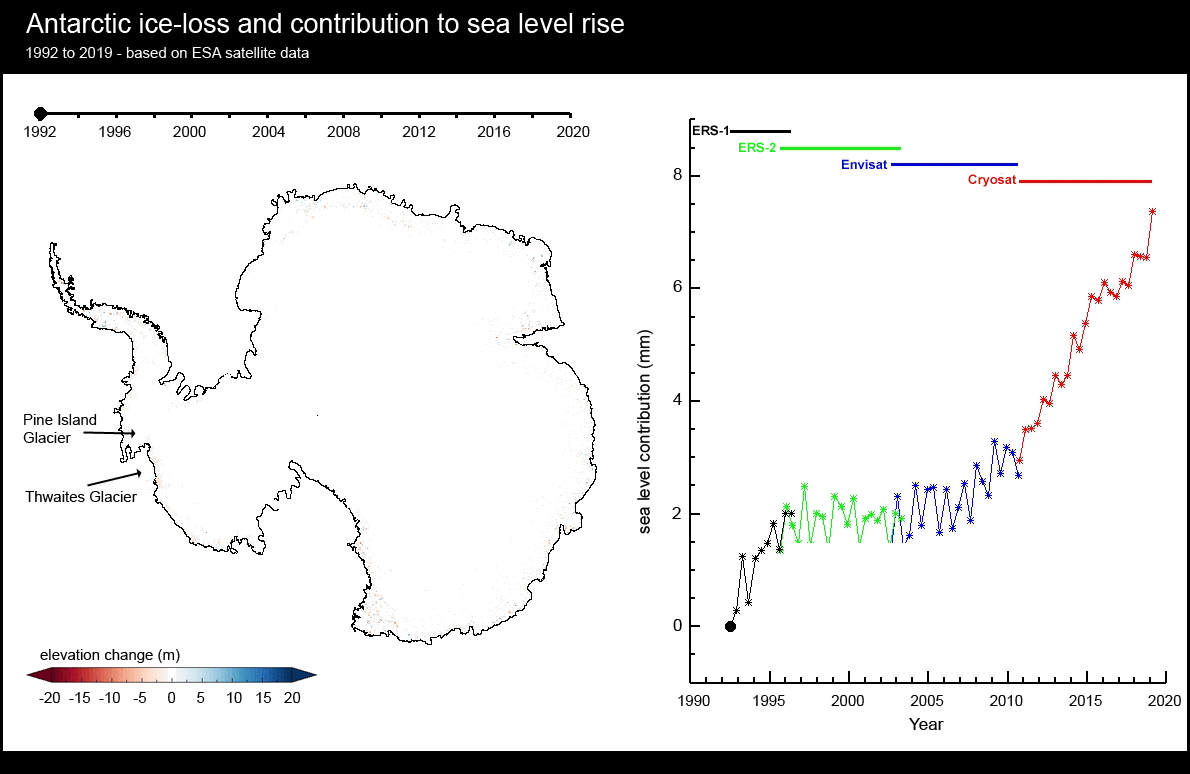
06.03.2019 BBC Mal McMillan describes how the Sentinel-3 mission can be used to monitor the Antarctic ice sheet
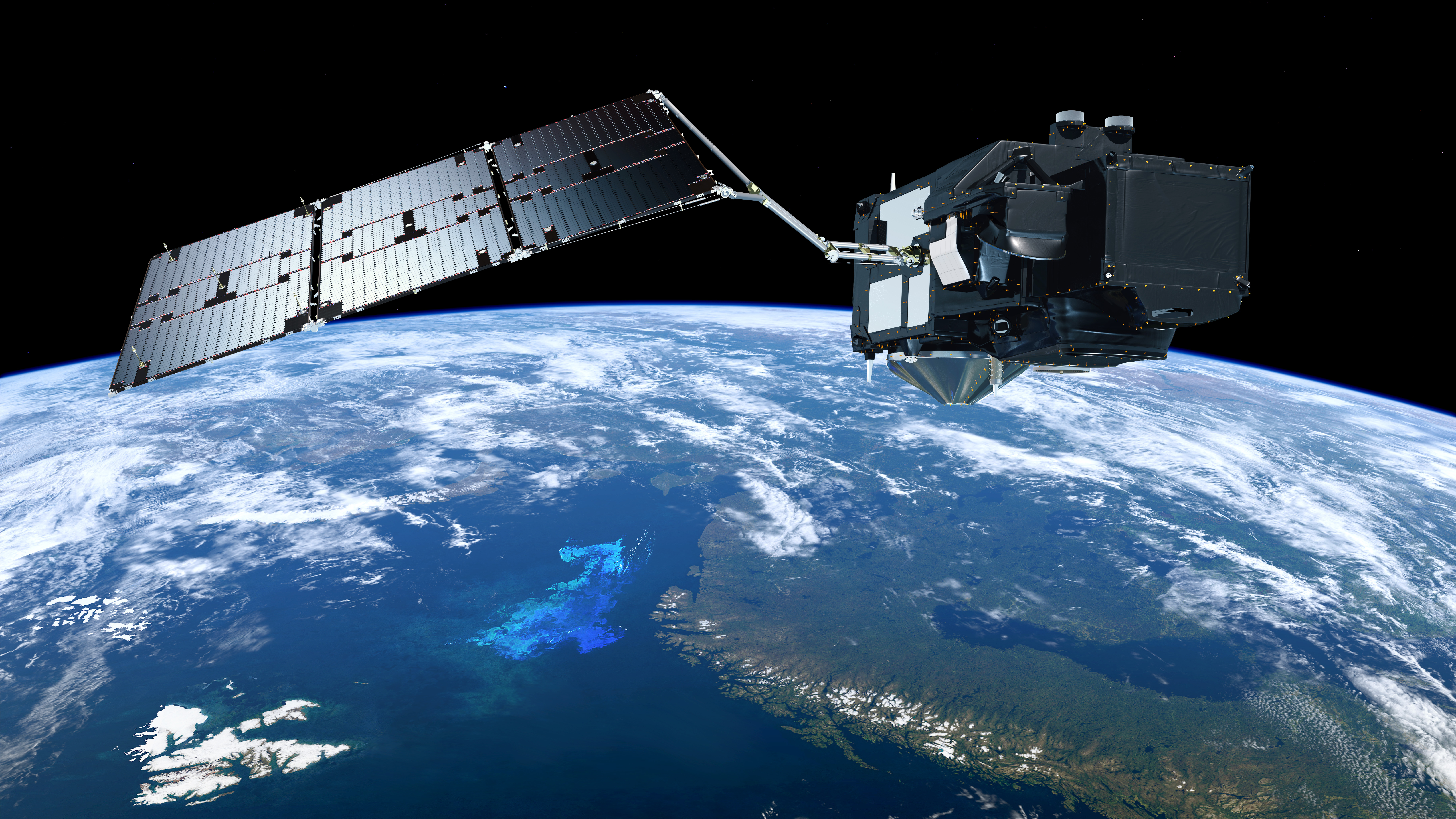
13.06.2018 BBC Andy Shepherd’s work on the Ice Sheet Mass Balance Intercomparison Exercise (IMBIE) shows how Antarctica is losing 159 billion tonnes of ice each year
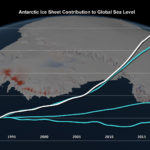
This study has been covered by more than 200 news outlets worldwide, also including The Guardian, The New York Times and Le Monde.
12.04.2018 Scientific American Hannes Konrad explains how warming ocean water is causing glaciers to melt
